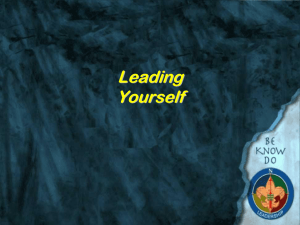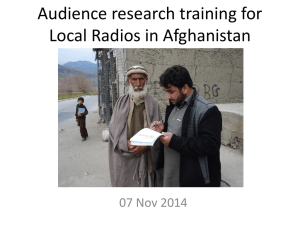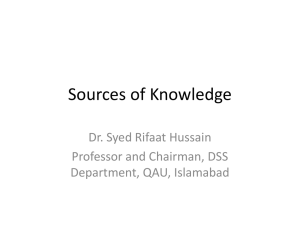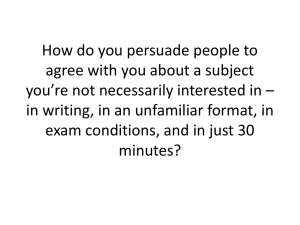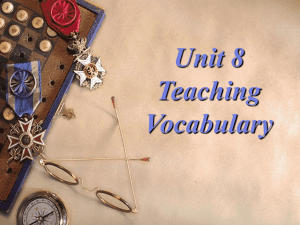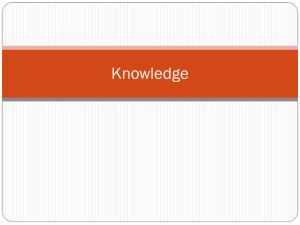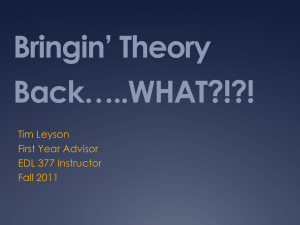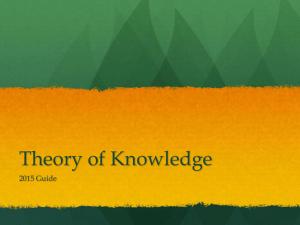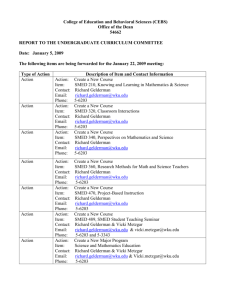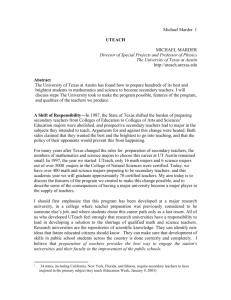SMED 310
advertisement
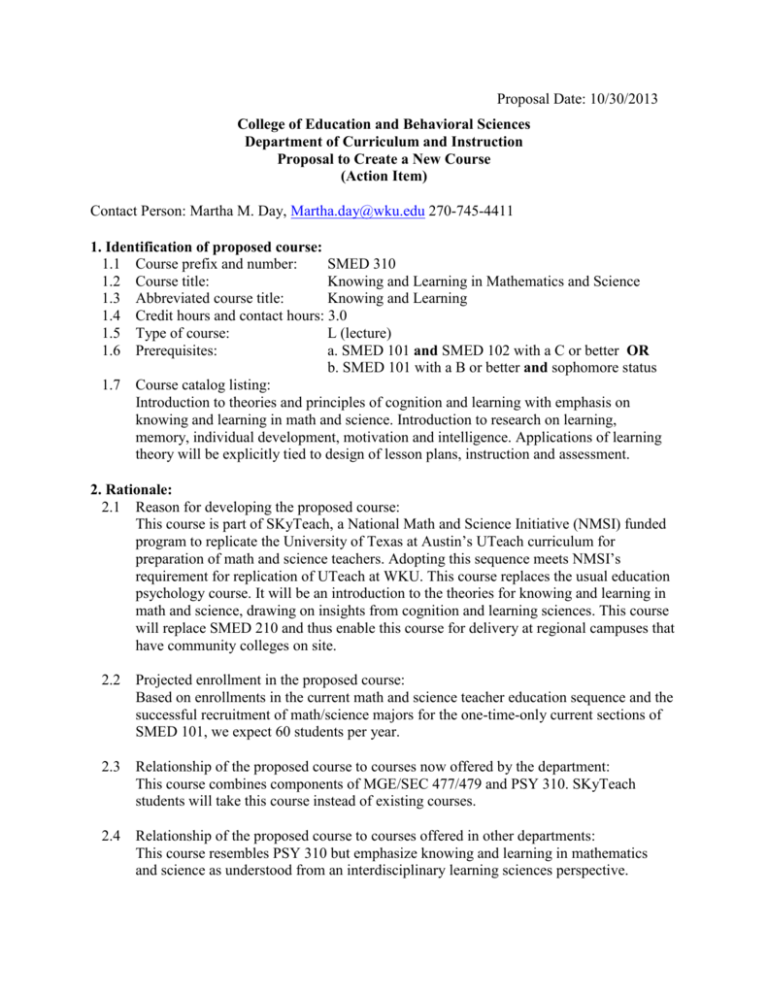
Proposal Date: 10/30/2013 College of Education and Behavioral Sciences Department of Curriculum and Instruction Proposal to Create a New Course (Action Item) Contact Person: Martha M. Day, Martha.day@wku.edu 270-745-4411 1. Identification of proposed course: 1.1 Course prefix and number: SMED 310 1.2 Course title: Knowing and Learning in Mathematics and Science 1.3 Abbreviated course title: Knowing and Learning 1.4 Credit hours and contact hours: 3.0 1.5 Type of course: L (lecture) 1.6 Prerequisites: a. SMED 101 and SMED 102 with a C or better OR b. SMED 101 with a B or better and sophomore status 1.7 Course catalog listing: Introduction to theories and principles of cognition and learning with emphasis on knowing and learning in math and science. Introduction to research on learning, memory, individual development, motivation and intelligence. Applications of learning theory will be explicitly tied to design of lesson plans, instruction and assessment. 2. Rationale: 2.1 Reason for developing the proposed course: This course is part of SKyTeach, a National Math and Science Initiative (NMSI) funded program to replicate the University of Texas at Austin’s UTeach curriculum for preparation of math and science teachers. Adopting this sequence meets NMSI’s requirement for replication of UTeach at WKU. This course replaces the usual education psychology course. It will be an introduction to the theories for knowing and learning in math and science, drawing on insights from cognition and learning sciences. This course will replace SMED 210 and thus enable this course for delivery at regional campuses that have community colleges on site. 2.2 Projected enrollment in the proposed course: Based on enrollments in the current math and science teacher education sequence and the successful recruitment of math/science majors for the one-time-only current sections of SMED 101, we expect 60 students per year. 2.3 Relationship of the proposed course to courses now offered by the department: This course combines components of MGE/SEC 477/479 and PSY 310. SKyTeach students will take this course instead of existing courses. 2.4 Relationship of the proposed course to courses offered in other departments: This course resembles PSY 310 but emphasize knowing and learning in mathematics and science as understood from an interdisciplinary learning sciences perspective. 2.5 Relationship of the proposed course to courses offered in other institutions: This course is a replication of the Knowing and Learning course in the University of Texas at Austin’s UTeach program. 3. Discussion of proposed course: 3.1 Course objectives: A-Applied Learning: Focus on process or technique This course introduces students to theories of cognition and learning as applied to the domains of mathematics and science. The learning sciences perspective draws from inquiry in a number of disciplines, including psychology, anthropology, sociology, biology, linguistics, neuroscience, individual developmental, and artificial intelligence. The perspective emphasizes investigation of standards for knowing, how knowledge is structured and how learning affects structure. The course will focus on tensions inherent in domaingeneral characterizations of understanding (e.g. intelligence) and domain-specific conceptions of knowing, in big ideas in math and science and the evolution of those ideas; and in math and science education. 3.2 Learning Outcomes: Students will be able to: 1. Articulate standards for knowing science and mathematics and the theoretical frames which give rise to such standards 2. Describe how knowing and learning are structured, how knowledge structures change, and how change is facilitated in math & science classrooms 3. Describe paradigms for evaluating understanding (i.e., theories of general intelligence versus expert/novice) 4. Describe links between coming to know science & math in individuals and the evolution of big ideas in the domains of math and science. 5. Articulate the interaction of domain/topic, aspects of individual learners & instructional choices on learning. 6. Conduct clinical interviews with subject(s) engaged in a problem solving activity. Students will record the interview, transcribe and analyze the activity. 7. Express informed opinions on current issues and tensions in education, especially as they relate to mathematics and science instruction. 3.3 Content Outline: Individual differences, cultural influences, social construction of knowledge, and equity issues will be considered within each topic as outlined below: Self Development and Social Development Brain Development and Cognitive Development Memory & Cognitive Load Intelligence The nature of knowing & Knowledge Structure Learning Theory Identifying & Responding to Individual Learning differences Motivation, Learning Goals, & Teacher Influences Knowledge Transfer Problem Solving: Representation & Strategies Conceptualization & Learning as Conceptual Change Creativity Standards for Math and Science Education Classroom Assessment Standardized Testing 3.4 Student Expectations and requirements: Evidence (Student Products) Contributing to class discussion Analysis of clinical interviews Examinations Term Paper Blogs Artifacts from clinical field experiences • Transcription and analysis of clinical interviews 3.5 Tentative texts and course materials: Bass, H. (1993). Let’s measure what’s worth measuring. Education Week, October 2005 Editorial Projects in Education. Bialystok, E. and Craik, F. (2006). Lifespan Cognition: Mechanisms of Change. Oxford University Press, 409 pp. Bransford, J.D., Brown, A.L., and Cocking, R.R., (eds.). (1999). How People Learn: Brain, Mind, Experience, and School. National Academy Press. Bruer, J.T. (1993). Schools For Thought: A Science of Learning in the Classroom. MIT Press: Bradford Books, 325 pp. Bruer, J.T. (1996), Knowing as Doing. The Culture of Education. Harvard Univ. Press. Carraher, T. Carraher, D. & Schliemann, A. (1985). Mathematics in the streets and in the schools. British Journal of Developmental Psychology, 3, 21-29. Darling-Hammond, L. and J. Bransford (eds.). (2005). Preparing Teachers for a Changing World: What Teachers Should Learn and Be Able to Do. Wiley: Jossey-Bass. Hong, J-C. and Liu, M-C. (2003). A study on thinking strategy between experts and novices of computer games. Computers in Human Behavior 19, 25-258. Kuhn, D. (2007) Reasoning about multiple variables: Control of variables is not the only challenge. Science Education, 91, 710-726. Kyza, E. and Edelson, D. (2005). Scaffolding middle school students’coordination of theory and evidence, Educational Research and Evaluation, 11, 545-560. Norman, D. (1994). Things That Make Us Smart: Defending Human Attributes in the Age of the Machine. Addison-Wesley. O’Connor, M. C. and Michaels, S. (1996). Shifting participant frameworks in Discourse, Learning and Schooling. D. Hicks (ed). Cambridge University Press, 290 pp. 4. Resources: 4.1 Library resources: 4.2 Computer resources: see attached library resource form and bibliography no new additional resources required 5. Budget implications: 5.1 Proposed method of staffing: 5.2 Special equipment needed: 5.3 Expendable materials needed: 5.4 Laboratory materials needed: current staff none none none 6. Proposed term for implementation: Fall 2014 7. Dates of prior committee approvals: School of Teacher Education: ___12/11/13_________ CEBS Curriculum Committee: ___02/04/2014_______ Professional Education Council: ___02/12/2014_______ University Curriculum Committee: ___________________ General Education Committee: ___________________ University Senate: ___________________
![Transformational Change [Powerpoint Presentation]](http://s2.studylib.net/store/data/005447411_1-da0a83bd34bdb90183940ab700125003-300x300.png)
